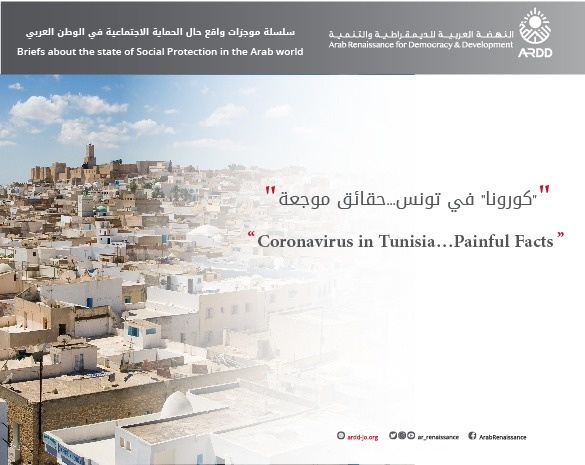The substantial financial hardships faced by thousands of Tunisian workers due to the general quarantine imposed in light of the Coronavirus have become evident. A striking example of this can be seen through the incident of a young Tunisian who set himself on fire, in protest of not being included in the exceptional social assistance allocated by the Republic of Tunisia for the poor as part of its efforts to confront the Coronavirus pandemic..[1]
This young man’s story is a devastating example of the issues that the Arab Renaissance for Democracy and Development (ARDD) is exploring as part of the reality of social protection in the Arab World. ARDD is working to address and combat poverty by conducting comprehensive research that analyses the measures taken by governments to address the needs of those who are the most impacted by the Coronavirus, namely refugees, daily workers, women, and children, and the elderly seniors.
In this brief, ARDD documents the responses of the Tunisian government, as well as the responses of Tunisian civil, human rights, humanitarian and labor organizations and youth initiatives towards the most impacted groups by the crisis. ARDD urges Arab governments to implement emergency response plans in order to protect their people against poverty.
The Coronavirus pandemic reached Tunisia on the 2nd of March, and as of the 10th of April of this year, it had officially registered 671 confirmed Coronavirus cases and 25 related deaths.
On the 22nd of March, Tunisian authorities undertook a series of measures regarding workers and economic institutions. Thus far, it has allocated TND300 million in assistance to workers facing unemployment, and TND500 million as a security line to enable businesses to obtain new loans to continue their work.[2] These significant figures correspond to the number of those living or below the poverty line in Tunisia, which exceeded 1,700,000 Tunisians last year. According to World Bank estimates, the rate of Tunisians living in extreme poverty is 3.5%, in addition to 700,000 “poor” persons.[3] The World Monetary Fund has granted Tunisia $754 million as an emergency loan to support its efforts to confront the Coronavirus pandemic, or alleviate its humanitarian, social and economic implications. The IMF has also anticipated that the country will witness its deepest economic recession since its independence in 1956.[4]
The implications of the Coronavirus in Tunisia have not been limited to Tunisians, but also affect immigrants and asylum seekers in Tunisia, many of whom have lost their jobs and are not able to benefit from assistance provided by relief organizations. This has prompted immigrants in one of the Capital’s shelters to launch a distress call to help them overcome this critical phase of the current circumstances. In fact, there are more than 3,500 refugees and asylum seekers in Tunisia, in addition to more than 20,000 immigrants, the majority of whom are from African countries and living in difficult social and living conditions that are likely to be exacerbated by the Coronavirus crisis.[5]
To face this pandemic, several Tunisian civil organizations have stepped up their efforts to support those in need by distributing packages containing basic food supplies, milk and detergents. Meanwhile, these organizations have called for the protection of the most vulnerable groups, especially migrants, refugees and asylum seekers residing in Tunisia, who do not enjoy the same rights as Tunisians; particularly with reference to the right to access health services.
It has been observed that the rates of violence against women in Tunisia have increased 5 times compared to the same period last year, and women’s associations in Tunisia are warning against the rise of domestic violence which has come in parallel to the quarantine imposed across the country.[6]
At the youth level, Tunisians has launched initiatives on social media, particularly Facebook, by creating two groups, “Volunteers against Coronavirus” and “Volunteers for Tunisia,” to ease the conditions of those in need, and to contribute to raising awareness and distributing food supplies in order to address the effects of the Coronavirus.[7]
As for human right organizations and their response to the Coronavirus pandemic, around 12 Tunisian human rights organizations and associations have rallied to call for a special amnesty for as many prisoners and detainees as possible or for their temporary release in accordance to law, to prevent the spread of the Coronavirus inside Tunisian prisons. These organizations have issued an open letter to call upon the President of Tunisia, Qais Said, to protect the largest number of prisoners by allowing them to serve half of the sentence required of them, and waiving the strict criteria to protect as many prisoners as possible.[8]
[1]“Coronavirus” deepens the crisis of the poor in Tunisia
[2]Tunisia.. Details of the “citizens and companies” aid package to confront Coronavirus
[3]In Figures…Poverty Invades Tunisia
[4]An Emergency Loan for Tunisia
[5]Refugees in Tunisia.. The Suffering Multiplied with Coronavirus
[6]Coronavirus increases rates of conjugal violence in Tunisia
[7]Citizen Initiatives to confront “Coronavirus” in Tunisia
[8]Tunisian human rights organizations call for the release of prisoners to protect against Coronavirus


